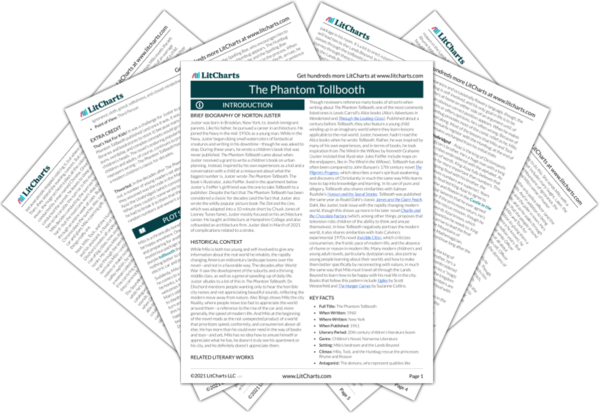Knowledge, Learning, and the Purpose of Education
In The Phantom Tollbooth, a chronically bored little boy named Milo comes home from school one afternoon to discover a mysterious package in his bedroom. The package contains a kit and instructions to construct a purple tollbooth, and when Milo drives through it in his toy electric car, it takes him to the Lands Beyond. This is a fantastical land where kings fight over whether words or numbers are more important, and the…
read analysis of Knowledge, Learning, and the Purpose of EducationLanguage, Wordplay, Fun, and Logic
The Phantom Tollbooth is a fundamentally silly book filled with puns, witty wordplay, and logic puzzles. At first, the wordplay puzzles young Milo, who isn’t good at spelling and, for that matter, has never cared to learn the meanings of most words. He also doesn’t entirely see the humor in many of the novel’s puns or logic puzzles. So part of Milo’s journey is developing the language skills to find the humor in these…
read analysis of Language, Wordplay, Fun, and LogicBoredom, Beauty, and Modern Life
Published in 1961, The Phantom Tollbooth is a reflection of the quickly changing midcentury world. In the novel, characters reflect on the rise of big cities, consumerism, and the increasing pace of modern life—but the novel suggests that all of these things detract from the joy of living. Young Milo is portrayed as a product of this setting: he hurries through his days, doesn’t see the point in doing anything, and can’t entertain himself despite…
read analysis of Boredom, Beauty, and Modern Life
Absurdity vs. Reason
When young Milo unexpectedly finds himself traveling through the Lands Beyond, he’s in for a shock. In the Lands Beyond, life is extremely absurd: Milo attends a banquet where he has to literally eat his words (which end up being very unappetizing) and Dr. Dischord creates all the loud, obnoxious sounds in existence. But not all of the absurdity in the Lands Beyond is fun or humorous: two warring kings argue about whether words or…
read analysis of Absurdity vs. Reason






